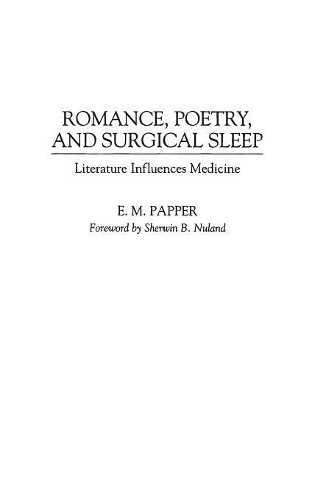
Romance, Poetry, and Surgical Sleep: Literature Influences Medicine
(Hardback)
Publishing Details
Romance, Poetry, and Surgical Sleep: Literature Influences Medicine
By (Author) E M Papper
Bloomsbury Publishing PLC
Praeger Publishers Inc
19th May 1995
United States
Classifications
Tertiary Education
Non Fiction
History of medicine
Cultural studies
617.9609
Physical Properties
Hardback
176
Width 156mm, Height 235mm
369g
Description
Pain and suffering, once associated with punishment for sin, became regarded as a purposeless evil that was hostile to human welfare. The works of Thomas Beddoes, Coleridge, and Shelley embody the change in attitude toward suffering and lay the groundwork for the general use of anesthesia in modern medicine. Papper contends that there was no real societal readiness to treat or prevent pain until the idea of the worth of the common man or woman was established by the upheaval of the French Revolution. The humanitarian concepts that we take for granted were relatively recent developments in Western society and were associated with the recognition of the importance of the individual.
Reviews
.,."should have wide appeal to those who are interested in romantic literature, the history of medicine, 19th-century and early 20th-century poets, and the discovery of anesthesia. While the question, "What took so long" may not be unique, it has not to my knowledge been critically examined. That it has now been studied by a scholar of English literature who also happens to be a world-renowned anesthesiologist is, indeed, unique, as well as an important contribution to our understanding of how Western civilization has come to view pain and the true significance of modern anesthesiology."-JAMA
...should have wide appeal to those who are interested in romantic literature, the history of medicine, 19th-century and early 20th-century poets, and the discovery of anesthesia. While the question, "What took so long" may not be unique, it has not to my knowledge been critically examined. That it has now been studied by a scholar of English literature who also happens to be a world-renowned anesthesiologist is, indeed, unique, as well as an important contribution to our understanding of how Western civilization has come to view pain and the true significance of modern anesthesiology.-JAMA
..."should have wide appeal to those who are interested in romantic literature, the history of medicine, 19th-century and early 20th-century poets, and the discovery of anesthesia. While the question, "What took so long" may not be unique, it has not to my knowledge been critically examined. That it has now been studied by a scholar of English literature who also happens to be a world-renowned anesthesiologist is, indeed, unique, as well as an important contribution to our understanding of how Western civilization has come to view pain and the true significance of modern anesthesiology."-JAMA
Author Bio
E. M. PAPPER is Professor of Anesthesiology and Pharmacology at the University of Miami School of Medicine where he was Dean of the Faculty of Medicine until 1981. He is the author of hundreds of publications and is one of the legends of American anesthesiology.
